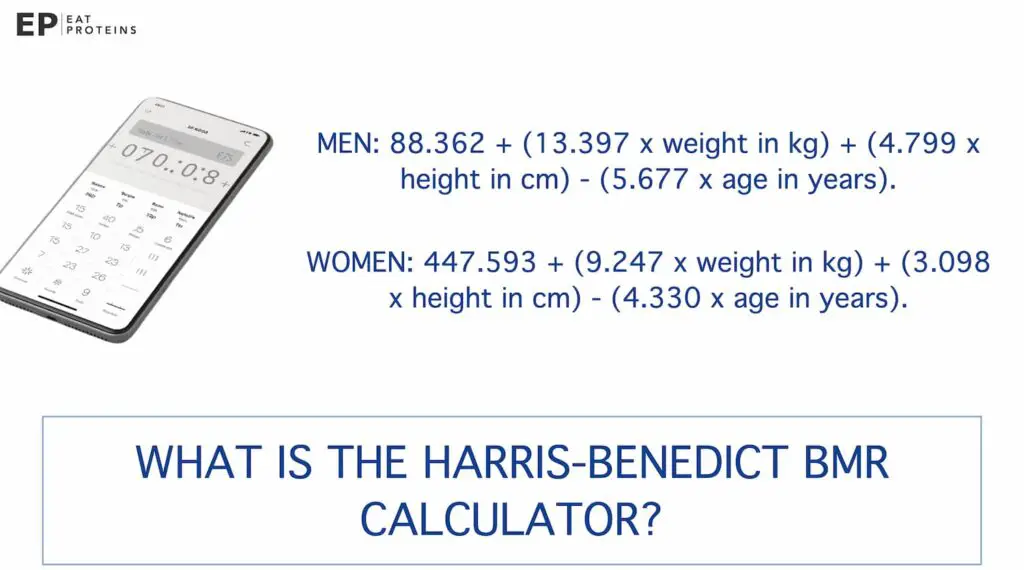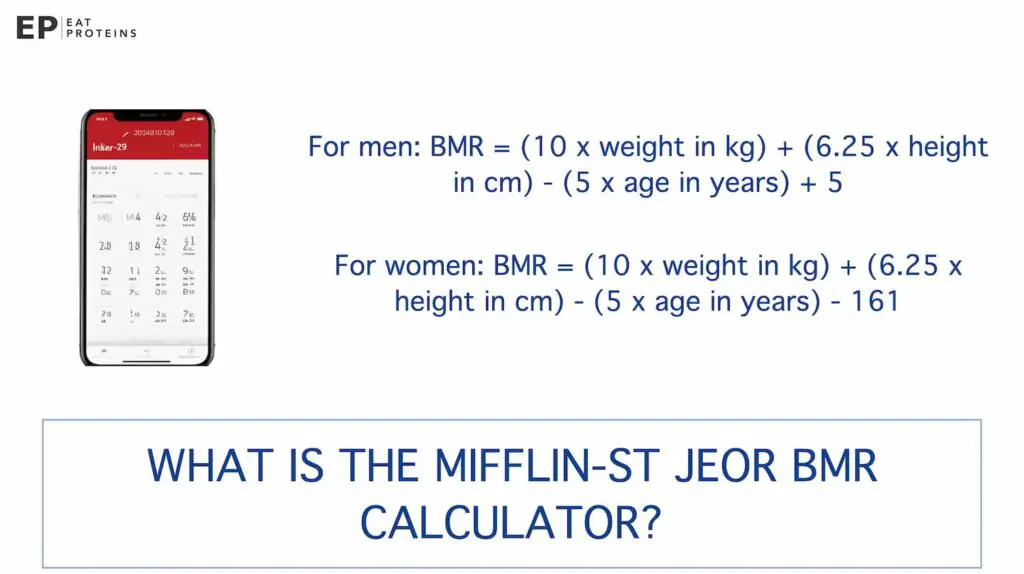The BMR calculator is a powerful tool that accurately determines your Basal Metabolic Rate (BMR), which is the number of calories your body needs to function at rest. Your BMR is influenced by factors such as age, gender, weight, and height.
By understanding your BMR, you can make informed decisions about your calorie intake and create a personalized diet plan for weight loss success. The main function of the BMR calculator is to provide an estimate of the calories your body needs to maintain basic bodily functions at rest. It is important because it allows individuals to determine their calorie needs and make adjustments to their diet accordingly.
The main benefit of using the BMR calculator is that it helps in creating a calorie deficit for weight loss, as it provides a baseline for determining the number of calories to consume. However, it is crucial to note that the BMR calculator only provides an estimate and should not be solely relied upon for weight loss.
The main drawback of relying solely on the BMR calculator for weight loss is the potential for inaccuracies, as it does not take into account individual variations in metabolism and activity levels. It is important to consult with a healthcare professional or registered dietitian for personalized guidance.
EatProteins.com is a reader-supported platform. Purchases made through our links may earn us a commission at no extra cost to you.
What is a BMR calculator?
A BMR calculator is a tool that estimates your Basal Metabolic Rate, which is the amount of energy your body needs to function at rest, says Nasim S. Sabounchi, Ph.D., from the George Warren Brown School of Social Work at Washington University in St. Louis.
A good BMR calculator should also calculate your total daily energy expenditure (TDEE), which considers your activity level. This helps determine the number of calories you need to consume to maintain, lose, or gain weight.
Some popular BMR calculators that incorporate these features include the BMR formula calculator, BMR calorie calculator, and BMR weight loss calculator. By using a reliable BMR calculator, you can gain a better understanding of your body’s energy needs and make informed decisions about your diet and weight management goals.

She adds, “It’s crucial to have an accurate BMR estimate when planning weight loss programs or assessing potential energy deficits in metabolically stressed patients.”
The most accurate and reliable BMR calculator is one that uses scientifically validated formulas such as the Harris-Benedict equation or the Mifflin-St Jeor equation. These formulas take into account your age, gender, weight, and height to provide a more precise estimation of your basal metabolic rate (BMR).
“The less known way to estimate BMR involves taking into account a person’s Body Mass Index (BMI), age, and gender,” says Eleni Pavlidou, a researcher at the Department of Food Science and Nutrition, University of Aegean in Athens, Greece.
Pavlidou continues, “What we found was that the Harrington equation, which considers BMI, age, and gender, showed the closest agreement with the BMR measured by the Fitmate device.”
How does a BMR calculator work?
A BMR calculator works by considering several factors to estimate the Basal Metabolic Rate (BMR), which is the number of calories your body needs to function at rest. These factors include age, gender, height, and weight.
- Age: The calculator takes into account age because as you get older, your metabolic rate tends to slow down. This is due to a decrease in muscle mass and a decrease in hormonal activity.
- Gender: Gender is an important factor as well. Men generally have a higher BMR compared to women due to a higher muscle mass and lower body fat percentage. Muscle is more metabolically active than fat, so having more muscle increases the BMR.
- Height: Height is factored in because taller individuals generally have a higher BMR. This is because a larger surface area requires more energy to maintain, resulting in a higher metabolic rate.
- Weight: Your weight is taken into consideration as well. A higher weight requires more energy to maintain, leading to a higher BMR. This is because a larger body mass requires more calories to fuel basic bodily functions.
What is the Harris-Benedict BMR calculator?
The Harris-Benedict BMR calculator is a formula used to estimate your BMR that takes into account your age, gender, height, and weight to calculate your BMR.

- For men, the formula is BMR = 88.362 + (13.397 x weight in kg) + (4.799 x height in cm) – (5.677 x age in years).
- For women, it is BMR = 447.593 + (9.247 x weight in kg) + (3.098 x height in cm) – (4.330 x age in years).
The specific numerical values in the formula are coefficients that have been derived from research and are based on the average metabolic rates observed in individuals of different genders, ages, heights, and weights.
The following is the Harris-Benedict BMR calculator.
Harris-Benedict BMR calculator
To use the Harris-Benedict BMR calculator, follow these steps.
- Choose your gender by clicking on the radio button next to “Male” or “Female”.
- Find the input field labeled “Weight (kg)” and type in your weight in kilograms.
- Locate the input field labeled “Height (cm)” and enter your height in centimeters.
- Find the input field labeled “Age (years)” and type in your age in years.
- Click on the button labeled “Calculate BMR”. Your BMR value will be displayed in the input field labeled “Your BMR”.
These coefficients represent the energy expenditure associated with these factors. By inputting your personal information into the formula, you can get an estimation of your BMR, which can then be used to determine your daily calorie needs for weight loss or maintenance.
What is the Mifflin-St Jeor BMR calculator?
The Mifflin-St Jeor BMR calculator is a formula that estimates your basal metabolic rate (BMR) based on your age, gender, height, and weight. It is considered one of the most accurate methods for determining your BMR.

This formula is considered more accurate and is recommended for individuals with a higher BMI. It calculates BMR as follows:
- For men: BMR = (10 x weight in kg) + (6.25 x height in cm) – (5 x age in years) + 5
- For women: BMR = (10 x weight in kg) + (6.25 x height in cm) – (5 x age in years) – 161
Mifflin-St Jeor BMR Calculator
To use the Mifflin-St Jeor BMR calculator, follow these steps.
- Select Gender: Locate the “Gender” options in the calculator form. You’ll see two radio buttons: one for “Male” and another for “Female”. Click on the radio button that corresponds to your gender.
- Enter Weight: Find the input field labeled “Weight (kg)”. Type your weight in kilograms into this field. Make sure to only enter numerical values.
- Enter Height: Look for the input field labeled “Height (cm)”. Type your height in centimeters into this field. Again, only numerical values should be entered.
- Enter Age: Locate the input field labeled “Age (years)”. Type your age in years into this field, ensuring that you enter a numerical value.
- Calculate BMR: Click on the button labeled “Calculate BMR”. This will run the calculation based on the information you’ve provided.
- View Result: Your BMR will be displayed in a read-only input field labeled “Your BMR”. The value will be in calories per day, rounded to two decimal places.
What is the NHS BMR calculator?
The NHS BMR calculator is a reliable tool for determining your basal metabolic rate (BMR) and total daily energy expenditure (TDEE).
The accuracy of the NHS BMR calculator is supported by the use of the Harris-Benedict equation, which has been validated by healthcare professionals. This equation considers the specific physiological differences between men and women, providing separate formulas for each gender.

What is the MyFitnessPal BMR calculator?
The MyFitnessPal BMR calculator is a tool that uses your personal information, such as age, gender, height, and weight, to determine your basal metabolic rate (BMR). The MyFitnessPal BMR calculator simplifies this process by providing an accurate estimate of your BMR, allowing you to make informed decisions about your calorie intake and achieve your weight loss goals effectively.
For example, a 30-year-old female who is 5’5″ (165 cm) tall and weighs 150 lbs (68 kg) may have a BMR of approximately 1,400 calories per day. With a sedentary lifestyle, her TDEE may be around 1,680 calories per day. To create a calorie deficit for weight loss, she may aim to consume around 1,200-1,500 calories per day.
What are the limitations of a BMR calculator?
One limitation of BMR calculators is that they might not be entirely accurate for individuals with severe or morbid obesity, says B. Müller, a researcher at the Department of Endocrinology and Diabetology, Universität Bern.
Our study, says Dr. Müller, published in Praxis in November 2001, evaluated predictive equations like Harris-Benedict and found that while they offer ‘acceptable precision,’ they are not always spot-on.
Müller elaborates, “We conducted our study on 43 patients with obesity class II and III, having a mean BMI of approximately 45.6 kg/m^2. When we compared calculated BMR to measured BMR using indirect calorimetry, we found some differences. For instance, for subjects with a body weight greater than or equal to 120 kg, the Harris-Benedict equation overestimated BMR by about 102.2%.”
He continues, “Interestingly, we also found that a modified version of the Harris-Benedict equation, recalculated by Roza et al., was more accurate than the original. This implies that existing BMR calculators could benefit from updates or modifications to increase their precision.”
Another key takeaway is that equations like the Nelson equation, which considers both lean body mass (LBM) and fat mass (FM), tend to be more accurate, adds Müller. This suggests that for a more precise BMR calculation, especially in obese individuals, incorporating additional variables like LBM and FM can be beneficial.
How accurate is a BMR calculator?
BMR calculators are generally considered to be a reliable tool for estimating your basal metabolic rate. However, the accuracy of BMR calculators can vary depending on several factors.
For example, variations in body composition, such as muscle mass and body fat percentage, can impact metabolic rate and may not be accurately accounted for by a calculator. Additionally, certain health conditions, like thyroid disorders, can affect BMR and may not be accurately reflected in the calculations.
Furthermore, as you age, your metabolic rate naturally decreases, so a BMR calculator may not accurately predict your calorie needs as you get older.
Lastly, BMR calculators typically provide estimates based on sedentary activity levels, so if you have a more active lifestyle, your calorie needs may be higher than what the calculator suggests.
How can a BMR calculator help you with meal planning?
A BMR calculator can serve as a foundational tool for meal planning by estimating the number of calories your body needs.
This information allows you to make informed decisions about your calorie intake and create a calorie deficit for weight loss. For example, if your BMR is 1,500 calories per day and you want to lose weight, you can consume 1,200 calories per day to create a deficit of 300 calories.

One tip for meal planning is to not just rely solely on BMR, warns Dr. Sabounchi. Remember to consider physical activity and the thermic effect of food, which also contribute to your total daily energy expenditure.
How can a BMR calculator help you gain weight?
A BMR calculator can help you gain weight by determining the number of calories you need to consume to create a calorie surplus and promote weight gain. This surplus provides your body with the energy it needs to build muscle and gain weight.
By consistently consuming more calories than your BMR, you can gradually gain weight in a healthy and controlled manner.
Which types of diets require BMR calculations?
Various types of diets require BMR calculations to tailor caloric intake and optimize results. These include calorie-counting diets, macronutrient-based diets like the ketogenic diet, and medically supervised weight-loss programs such as Optavia. Athletes following performance-based diets and individuals on intermittent fasting regimes also often utilize BMR calculations to schedule their eating windows and caloric needs effectively.
How does the Optavia diet integrate BMR calculations for meal planning?
The Optavia diet integrates BMR calculations in its Optimal Health 3 and 3 plan, which is a maintenance phase following the initial weight loss period. Knowing your BMR and TDEE allows the program to personalize your caloric intake, helping you maintain your weight effectively. The calculation of your metabolic rate ensures that the six daily meals in the 3 and 3 plan are tailored to meet your energy needs without causing weight gain.
What is the difference between a BMR calculator and a TDEE calculator?
The difference between a BMR (Basal Metabolic Rate) calculator and a TDEE (Total Daily Energy Expenditure) calculator lies in their purpose and the information they provide.
- BMR calculator: This calculator estimates the number of calories your body needs to maintain basic functions at rest, without considering your activity level. It provides a baseline estimate of your calorie needs.
- TDEE calculator: TDEE takes into account your BMR and factors in your activity level to determine the total number of calories you burn in a day. It provides a more accurate estimate of your calorie needs based on your activity level.
How can a BMR calculator be used for bodybuilding?
To optimize bodybuilding goals, a BMR calculator can be used to determine the precise caloric intake needed for muscle growth and maintenance.
For example, an athlete with a height of 72 inches, weight of 180 lbs, age of 25, and male gender would have an estimated BMR of 1900 calories/day. If the goal is to gain muscle mass, caloric intake should exceed the TDEE. On the other hand, if the aim is to lose body fat while preserving muscle, a calorie deficit is needed.
